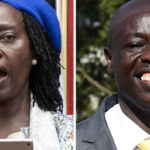
The UK government on Tuesday unveiled a plan to drastically overhaul post-Brexit trade rules in Northern Ireland, arguing the changes are needed to end political paralysis in the divided territory.
But the European Union, defending the so-called Northern Ireland Protocol and the integrity of its vast single market, vowed reprisals if Britain pushes ahead with its unilateral plans.
London said it would introduce legislation reforming the protocol “in the coming weeks” — unless Brussels caves on its refusal to renegotiate the pact.
The protocol was agreed as part of Britain’s Brexit divorce deal with the European Union, recognising Northern Ireland’s status as a fragile, post-conflict territory that shares the UK’s new land border with the European Union.
Its requirement for checks on goods arriving from England, Scotland and Wales has infuriated pro-UK unionists in Northern Ireland.
They claim the protocol is undermining their place within the UK, and are refusing to join a new power-sharing government in Belfast following elections this month.
The UK plan would scrap most of the checks, but the government denied it was trashing international law by abrogating a key element of the Brexit deal agreed by Prime Minister Boris Johnson in 2019.
“I think the higher duty of the UK government in international law is to the (1998) Good Friday Agreement and the peace process,” Johnson told reporters.
“We don’t want to nix it (the protocol), we want to fix it, and we will work with our EU partners to do it,” he said.
– ‘Rogue state’ –
But the EU issued no hint of compromise, after warning that any UK violation of the Brexit pact could see it hit back with swingeing tariffs.
“Unilateral actions contradicting an international agreement are not acceptable,” European Commission Vice-President Maros Sefcovic said.
The UK plan “raises significant concerns”, he added, warning that the EU “will need to respond with all measures at its disposal” if London goes ahead.
Irish Foreign Minister Simon Coveney called the UK step “damaging to trust”.
Johnson, however, said a trade war was unlikely — and the UK can ill-afford one, at a time when its people are grappling with the worst inflationary crisis in a generation.
“But what we have to fix is the problems with the Northern Ireland political situation, where you can’t get the executive up and running,” he said, a day after visiting Belfast for talks with Northern Ireland’s main parties.
The largest pro-British party, the Democratic Unionist Party (DUP), says it will not share power with pro-Irish rivals Sinn Fein until the protocol is reworked.
Its line has hardened since Sinn Fein won a historic victory in elections to the Northern Ireland Assembly two weeks ago, which entitled the party to the role of first minister in a joint regional government with the DUP.
In the London parliament, DUP leader Jeffrey Donaldson said the UK government’s announcement was a “good start” that could help restore the Belfast executive. But he insisted progress on an actual bill was needed in “days, not weeks”.
For her part, Sinn Fein leader Mary Lou McDonald accused Britain of acting like a “rogue state”.
– US ire –
Keeping the border open with neighbouring Ireland, an EU member, was mandated in the Good Friday Agreement, given the frontier was a frequent flashpoint during three decades of violence in Northern Ireland until 1998.
But it means checks have to be done elsewhere, to prevent goods getting into the EU single market and customs union by the back door via Northern Ireland.
Under the new plan, the UK intends unilaterally to create a “green channel” for British traders to send goods to Northern Ireland without making any customs declaration to the EU.
The EU would have access to more real-time UK data on the flow of goods, and only businesses intending to trade into the single market via Ireland would be required to make declarations.
The EU would need to trust the UK to monitor the flow, and UK Foreign Secretary Liz Truss vowed “robust penalties” for any companies seeking to abuse the new system.
The plan would also seek to end oversight of the protocol by the European Court of Justice — another red line for Brussels.
Britain also risks antagonising the United States, which helped broker the Good Friday Agreement.
Democratic Congressman Bill Keating, speaking on Britain’s Times Radio from Washington, said any UK action on the protocol should not resort to “breaking international law”.
If the bill goes ahead, British hopes for a post-Brexit trade deal with the US “will be scuttled in the process”, he added.
jit/jj/pvh




